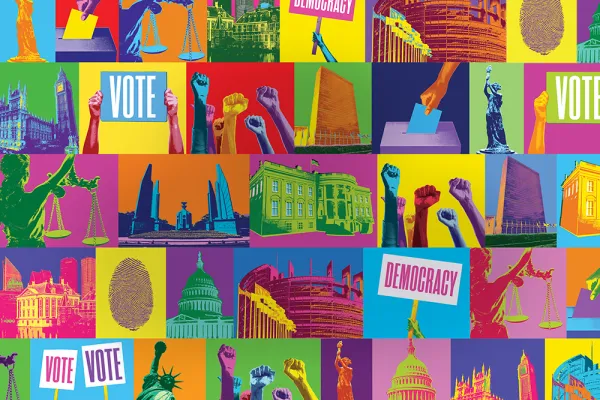Year on Democracies
Published September 9, 2021
“It has been said that democracy is the worst form of government except for all those other forms that have been tried.”—Winston Churchill, British House of Commons, 1947
Churchill’s “worst form of government” has nevertheless remained a default aspiration for much of the world over time. From the earliest uses of the word democracy to describe the “rule by the people” of the city-state of Athens in the 5th century BCE to newer democracies like Burkina Faso (2015), from the largest democracy (India) to the smallest (Nauru), to the most powerful (putatively the United States of America), democracies have been founded both in spite of deeply undemocratic conditions or even on such undemocratic principles (e.g., slavery). The word can be mobilized to describe increased access, as in the democratization of information and knowledge by the spread of public libraries. But it can also be mobilized as a misdirection, as with Hitler’s description of Nazi Germany as a “beautiful democracy.” In a recent New Yorker piece, Harvard historian Jill Lepore suggested that “it’s a paradox of democracy that the best way to defend it is to attack it, to ask more of it, by way of criticism, protest and dissent.” What is it, exactly, that is up for defensive attack?
The Kahn Liberal Arts Institute is partnering with the Provost's Office for the next campus-wide themed year in 2021-22, focusing on democracies. A thorough examination and contemplation of democracies must proceed through the curriculum, exhibitions, performances, lectures, special events, and the collaborative work that happens in Smith’s Centers and at the Kahn. Smith College’s particular here and now places us in one of the most intense struggles about what constitutes democracy of our lifetimes, and it would be easy, vital as this moment is in and for the US, to overlook other important frameworks, small and large, local and global—hence the insistent pluralization. We mean for democracies to remain a term as capacious and unbridled from rigid political definitions as possible, to encourage the full breadth of the faculty to engage in this set of critical conversations.
Contact Kahn Institute Director Alexandra Keller (akeller@smith.edu) to suggest a project and schedule a meeting for further discussion.
On December 3, 2020, the Kahn Institute hosted this panel as the first event in anticipation of the collegewide theme Year on Democracies.
Democracy at the Edge: A Global Consideration of the U.S. Election
The reverberations of U.S. presidential elections are felt around the world, perhaps never more than with the recent election. This panel assembled the co-organizers of the 2021–22 yearlong Kahn Institute projects Coping with Democratic Precarity and the Prospects for Democratic Renewal and Democracies Redux: Resumptions, Resilience, Reconciliation, and Restoration to reflect on the election results and consider the implications internationally and with a broad range of analytical lenses.
